Fueling the future: The global, North American, and local impact of the LNG revolution
Rahul Verma and Brian Betti explore how cleaner-burning gas is changing the energy landscape.


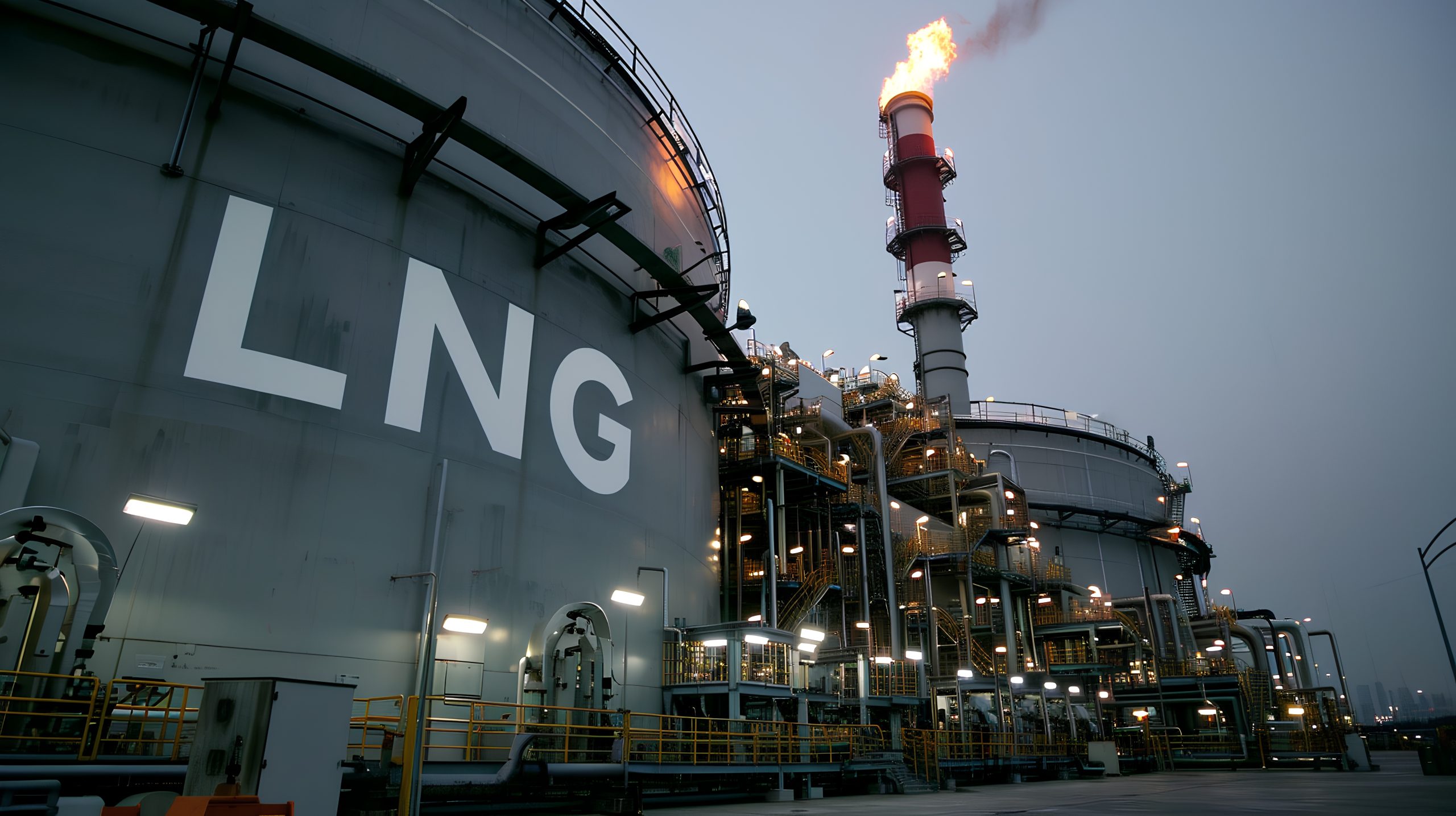
Rahul Verma and Brian Betti explore how cleaner-burning gas is changing the energy landscape.
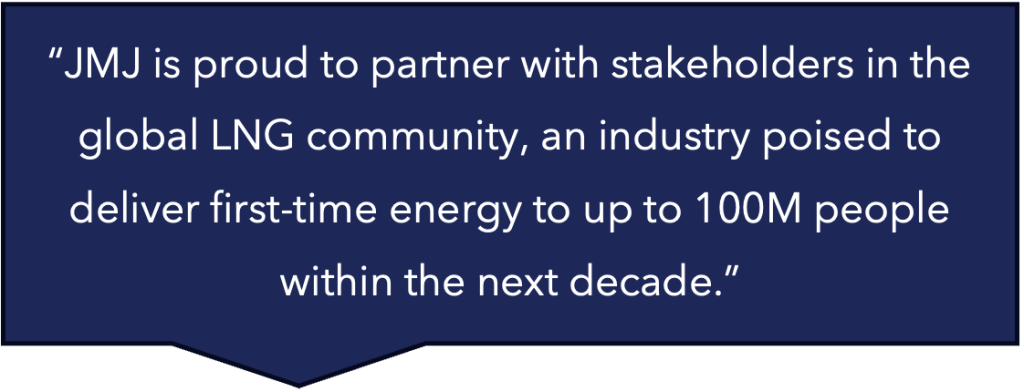
Liquefied Natural Gas (LNG) has become a major player in the global energy landscape, with demand estimated to rise by around 50% by 2040. This sharp increase is primarily driven by environmental pressure to switch from coal to cleaner-burning gas, especially in many Asian countries[1]. Where pipelines are not viable, LNG is an efficient way to transport natural gas from producing regions (e.g., North America) to remote markets[2]. On a local level, the rise of the LNG industry is sparking economic revitalization through job creation, infrastructure development and community partnership.
JMJ is proud to partner with stakeholders in the global LNG community, an industry poised to deliver first-time energy to up to 100 million people within the next decade[3]. This initiative is expected to significantly boost the economic power of locals in remote, underserved economies. In this article, we will explore some of the potential effects of this ‘LNG revolution,’ examining its global implications, its influence within North America and its impact on local communities.
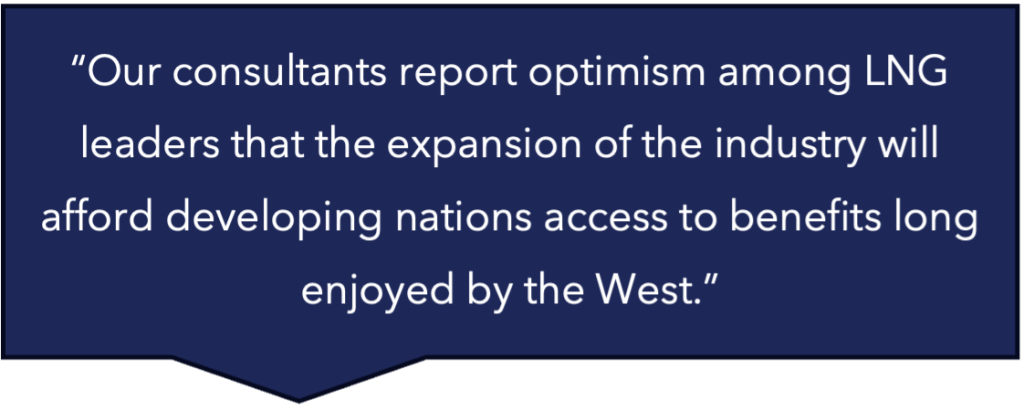
Globally, LNG is reshaping the energy market by offering countries a cleaner alternative to traditional energy sources. It bridges the gap between fossil fuels and renewable energy sources, especially in countries like India and China as they strive to meet international climate commitments.
The flexibility of LNG compared to pipeline gas, enables it to reach varied and previously inaccessible markets. These developments pave the way for improved public services, educational opportunities, and overall economic growth. Our consultants report optimism among LNG leaders that the expansion of the industry will afford developing nations access to benefits long enjoyed by the West. They acknowledge the importance of equitable energy in global progress and are committed to playing a part in achieving it.
North America is leading the LNG revolution, with the United States emerging as the world’s largest LNG exporter in the first half of the 2022[4]. In the coming years, additional capacities from Canada and Mexico will bolster this ‘North American effect,’ boosting Gross Domestic Product (GDP) across all three nations.
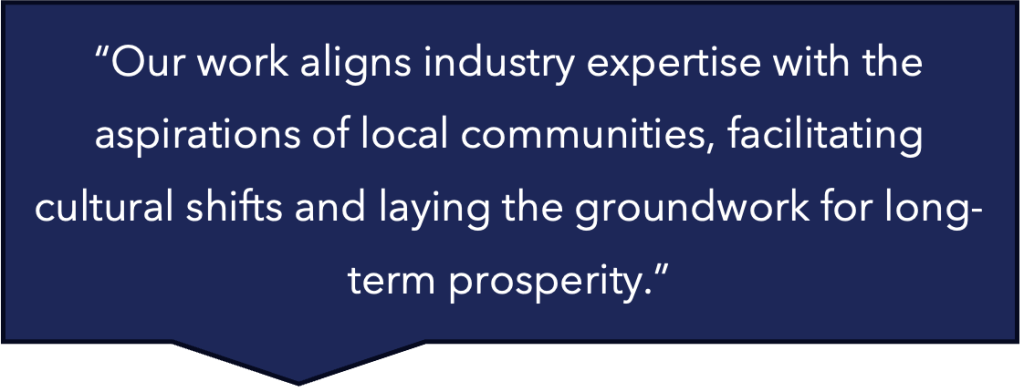
North American LNG companies are setting the benchmark for environmental sustainability with technological advancements in extraction and emissions control. These gold-standard practices are expected to guide other regions in environmental conservation efforts.
In partnership with the LNG community, JMJ has witnessed a surge in economic development and job creation in North America. Our work aligns industry expertise with the aspirations of local communities, facilitating cultural shifts and laying the groundwork for long-term prosperity.
JMJ is committed to supporting our clients in ensuring the sustainability of the LNG industry, with a strong focus on minimizing the environmental footprint locally. The local effects of LNG development vary significantly between communities. In regions that host LNG terminals or natural gas reserves, the economic benefits are tangible, including job creation, infrastructure development, and increased local revenues. These benefits mirror the positive outcomes we’ve seen worldwide.
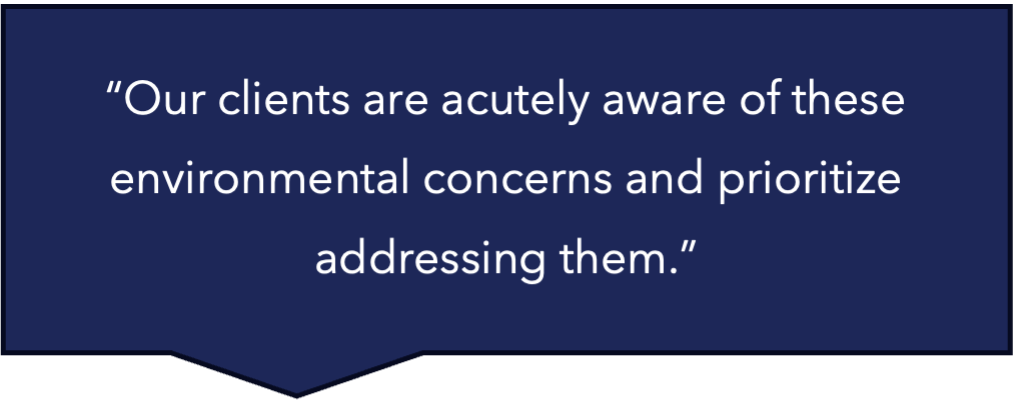
At the heart of the LNG debate are the indigenous and rural communities who are directly affected by such projects. While the promise of economic growth wins support in some areas, concerns about environmental harm and loss of traditional territories are paramount in others. This calls for a balanced approach that values community feedback and incorporates sustainable practices into the expansion of the LNG industry.
Our clients are acutely aware of these environmental concerns and prioritize addressing them, as expressed by one industry leader who said:
How proud I am of the work being done on his project site to minimize the environmental impact, and the work the company intends to do in the future to restore any damages and off-set the carbons that were required to build the plant.”[5]
The future of LNG is not just about harnessing natural gas reserves. From a macro perspective, LNG promises cleaner energy for developing nations, while at the micro level, it fuels economic growth, creating job opportunities and empowering local and indigenous communities. LNG is quite literally, fueling local economies on a global scale, with every stage from extraction to distribution potentially impacting the lives of billions.
We leave you with another quote from one of our partners:
Being part of this construction project for this LNG facility fills me with pride for several reasons:
- LNG represents a crucial step towards cleaner energy, serving as a transition fuel and contributing to a more sustainable future.
- This opportunity allows me to develop my career in the construction industry, honing my skills and gaining valuable experience.
- Working on this project enables me to build meaningful relationships with colleagues and stakeholders, fostering a sense of camaraderie and collaboration.
- This project showcases the innovative capabilities of the construction industry, positioning it as a leader in the global energy transition.
By spearheading such initiatives, we not only contribute to the national economy, but also set the precedent for future sustainable infrastructure projects, globally.”[6]
Ready to learn more and become a part of this transformative journey? Visit our website to explore how you can contribute to the future of sustainable energy with JMJ. Let’s build a cleaner, more prosperous world together. Contact us
Rahul Verma is Director of Strategic Accounts with JMJ. He has a 15+ year background in consulting, spanning industries such as oil & gas, mining and metals, finance, supply chain, operations and technology. He has delivered value to customers in the Americas, Europe, Middle East, Asia and Australia.
Brian Betti is a Senior Consultant with almost two decades of experience. He has extensive consulting experience in oil and gas, mining, construction, steel manufacturing, power and electric, renewable energy, and marine industries. Brian facilitates improvements in employee and organizational performance through face-to-face consultation with both individuals and corporate leadership. He is adept at establishing credibility with clients as an effective developer of impactful solutions to organizational, employee, and safety challenges as well as being an agent for change to improve performance metrics.